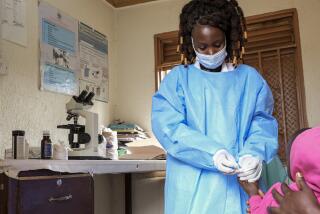Africans Try to Break Silence on AIDS Even as Ailment Consumes Their Continent
- Share via
ABIDJAN, Ivory Coast — When Juliana Gbami’s husband died three years ago, doctors told her the cause was kidney failure. Just kidney failure.
Three months later, when she developed recurring fevers, diarrhea and chronic fatigue, they said it had really been AIDS, and that she had it too.
“That’s when I collapsed and really fell ill,” said Gbami, a retired social worker.
Even as AIDS consumes their continent, many Africans can’t bring themselves to even mention it. Experts say that’s one reason the disease is spreading.
Africa accounts for 10 million of the world’s 16 million cases of infection with HIV, the virus that causes AIDS, according to the World Health Organization.
Gbami belongs to something almost unheard of in Africa: an AIDS support group dedicated to breaking the fatal taboo of silence.
“It started very, very tentatively,” said Dr. Marc Aguirre, an American working at the Medical and Social Assistance Center, financed by the Church of Christ. “A lot of these people are very reticent. But we basically had a party and got people talking about themselves.”
Experts say cultural modesty and a deep reluctance to be the bearer of bad news are powerful social forces in Africa, even among some doctors.
“Africans with AIDS do not go and see their doctors because of our traditional sense of modesty and shame,” said Yaya Diallo, a Senegalese sociologist at the University of Dakar.
“They prefer to ‘leave it to God’ to decide their fate, and try traditional medicine.”
Gbami said her doctor, an old friend of her husband, was reluctant to admit her spouse died of AIDS, and could not face her with the news.
Instead, he sent two other doctors to tell her.
The support group called “The Friends Club,” which began meeting weekly in July, represents a quiet revolution that has even led some people to become crusaders for community awareness.
“I want to tell people that, with HIV, you can still live,” said Etienne Tapie, 28, who was diagnosed in March as HIV positive. “It is not the end of the world.”
“When you mention AIDS, everyone is afraid. No one even wants to touch you. I have friends like me who have been chased out of their houses, who are all alone,” added Tapie.
Not at The Friends Club, which Tapie helped organize.
Club meetings, which draw 35 to 40 people, are lively, positive and animated.
They include a pretty teen-age girl, the soft-spoken Gbami, a lanky father of four.
A stereo belts out pop hits.
The frank, intimate talk ranges over health, politics and the devastating emotional toll taken by the disease.
“There’s such a need for people to open up and talk to someone,” said Aguirre. “That is all we aim to provide, really.”
Ivory Coast, with 18,670 documented AIDS cases in a population of 13 million, is West Africa’s most affected country.
AIDS is the leading cause of death of adult men and the second-leading cause, after childbirth, of death among women.
More to Read
Sign up for Essential California
The most important California stories and recommendations in your inbox every morning.
You may occasionally receive promotional content from the Los Angeles Times.













